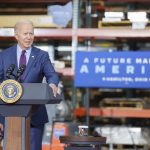Republican senators stated that Donald Trump's proposal to eliminate taxes on tipped wages didn't originate from policy experts or extensive research but rather from a waitress he encountered. The senators recounted Trump’s remarks during a closed-door meeting at the campaign headquarters of Senate Republicans. Senator Kevin Cramer shared that Trump described the idea as coming from a waitress rather than from extensive research. Senator Josh Hawley also confirmed Trump’s tale. The Trump campaign declined to comment on the timing or process by which the candidate developed the idea.
At a campaign rally in Las Vegas, Trump pledged to eliminate federal taxes on tipped wages, specifically addressing hotel workers and people who receive tips. He assured voters this would be a priority early in his potential presidency. The previous year, the IRS introduced a new wage reporting program aimed at service industry workers who heavily depend on tips, triggering worries among Republican lawmakers. They expressed concerns that low- and middle-income taxpayers could face audits following the approval of new funding for the agency by Democrats. The suggested voluntary program aims to enhance tip reporting compliance by utilizing point-of-sale systems and electronic payment methods.
“His story — it was so much fun — [was]. about the waitress that gave him the idea to not to tax tips,” said Sen. Cynthia Lummis, Wyoming Republican. https://t.co/GObpiYlROY
— The Washington Times (@WashTimes) June 14, 2024
Republican Senator Cramer recalled Trump’s remark that he would like everyone to believe the idea came from expensive research. Still, in reality, it went from a waitress who expressed concerns about the IRS targeting her tips. The subject surfaced in the meeting as Senator Tim Scott highlighted the significance of reaching working-class voters.
In summary, Trump’s proposal to eliminate taxes on tipped wages is receiving support from Republican senators, who emphasized its origins in Trump’s interaction with a concerned waitress rather than in extensive research or policy discussions. The proposal aligns with Trump’s focus on working-class voters and his campaign promises to support this group.




